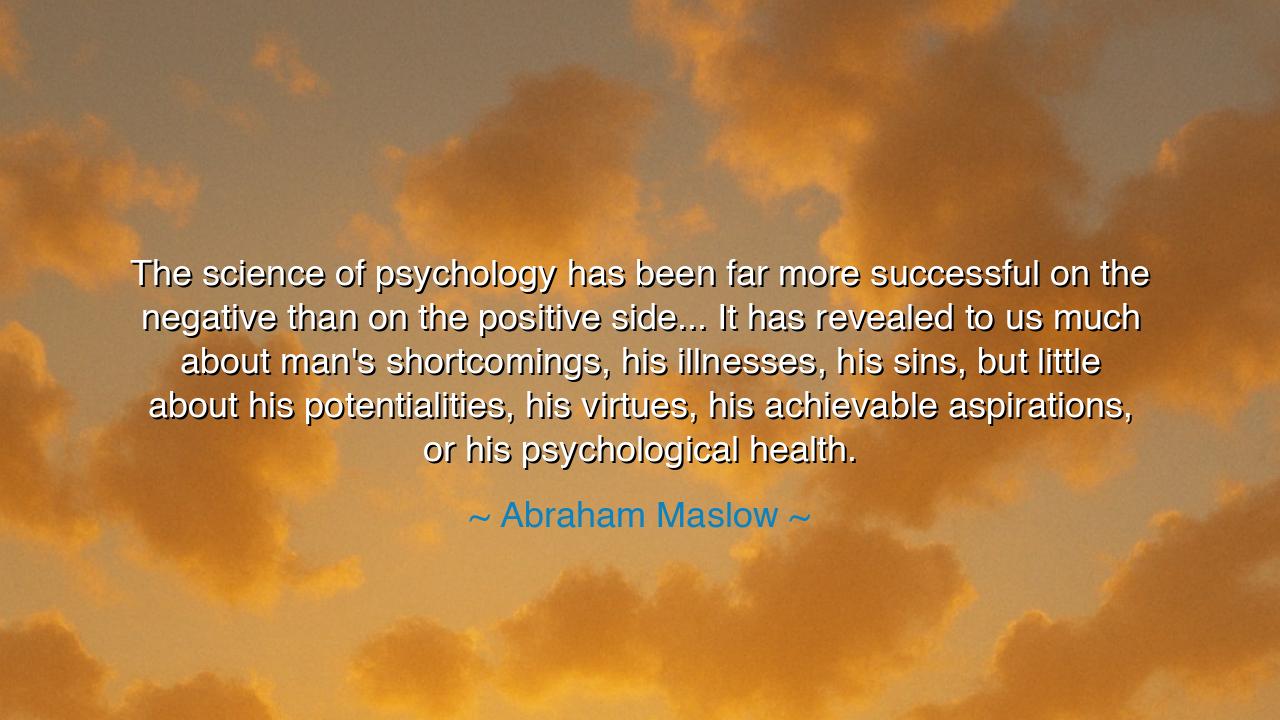
The science of psychology has been far more successful on the
The science of psychology has been far more successful on the negative than on the positive side... It has revealed to us much about man's shortcomings, his illnesses, his sins, but little about his potentialities, his virtues, his achievable aspirations, or his psychological health.






In the wisdom of Abraham Maslow, the great explorer of the human spirit, there shines a lament and a challenge: “The science of psychology has been far more successful on the negative than on the positive side... It has revealed to us much about man’s shortcomings, his illnesses, his sins, but little about his potentialities, his virtues, his achievable aspirations, or his psychological health.” These words were not spoken as complaint, but as a cry to awaken humanity to its higher destiny. For Maslow, who wandered the corridors of the human mind, saw that science had become skilled at dissecting misery, yet blind to the sunrise of greatness that dwells within each soul.
From the ancient philosophers to the healers of the modern age, men have sought to understand what ails the human heart. Psychology, in its early form, became a medicine for the mind — a lantern shining upon the shadows of suffering. It revealed fear, guilt, trauma, and despair, and gave names to the demons that haunt mankind. Yet, as Maslow saw, this noble discipline had built its home near the valley of the broken, and not upon the mountain of the whole. It knew much of sickness, but too little of health; much of despair, but little of joy; much of weakness, but little of potential.
To speak of potentialities, as Maslow did, is to speak of the divine spark within humankind — that unseen power by which ordinary beings ascend to extraordinary heights. It is the force that made Michelangelo carve angels from marble, that stirred Gandhi to confront an empire with peace, that inspired the poet to turn pain into beauty. Yet in studying man’s wounds, we have forgotten his wings. Maslow sought to restore this balance — to remind the world that psychology must not merely heal what is broken, but nurture what is possible.
Consider the life of Helen Keller, who was both blind and deaf from infancy. By every measure of limitation, she should have remained in darkness. Yet under the patient guidance of her teacher, Anne Sullivan, the fire within her spirit blazed forth. She learned not only to communicate, but to inspire millions. Her story is proof of Maslow’s vision: that within every person lies a vast realm of aspiration waiting to be awakened. The world had seen her disability; Maslow would have seen her self-actualization — the full flowering of her humanity.
The ancients would have understood Maslow’s cry. The Stoics spoke of cultivating virtue; the Buddhists of achieving enlightenment; the Greeks of reaching arete, the perfection of one’s nature. Yet in the age of analysis, we have learned to treat the mind as a machine that breaks, rather than a garden that can bloom. To fix the parts is necessary, yes — but to neglect the growth of the spirit is to leave the soul impoverished. The science of the positive, the study of courage, compassion, creativity, and meaning, must rise to meet the science of the negative, so that mankind may be healed not only from illness, but from emptiness.
Maslow’s vision gave birth to what we now call humanistic psychology, a turning of the gaze toward self-actualization — the realization of one’s fullest self. He believed that every person, beneath their fears and failures, carries the same seed of greatness. To cultivate that seed requires not merely therapy, but purpose; not only analysis, but inspiration. For the soul does not thrive on diagnosis alone; it flourishes in the presence of hope, creativity, and love.
Let those who hear this teaching take it into their own hearts. Do not dwell forever on your wounds; learn from them, yes, but rise beyond them. Seek your virtues as diligently as you have examined your faults. Nourish your mind with wonder, your body with care, and your spirit with noble pursuits. Ask not only, “What is wrong with me?” but, “What is possible for me?” For the human being was not born to crawl among brokenness, but to ascend toward light.
And so, as Maslow taught, let psychology — and life itself — turn its face toward the sun. Let us study not only the shadow, but the glory of human potential. Let every soul remember that within its depths lies both the sickness and the cure, the wound and the awakening. And when the world once again seeks the wholeness of man — his virtues, his aspirations, his health — then shall we see not merely a healed humanity, but a fulfilled one.






AAdministratorAdministrator
Welcome, honored guests. Please leave a comment, we will respond soon